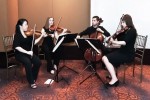Column Name
Title
Networking, writing a cover letter, and creating a personal Web site are probably not what a private violin teacher has planned for a lesson on the Brahms Concerto, but for an artist to be successful in the professional world, these skills can be just as important as achieving perfect intonation. Luckily, the Career Services Office is available to guide students through the transition from conservatory life into the “real” world. With opportunities like the Hire a Juilliard Performer roster (a.k.a. “the gig list”), Lunch and Learn seminars, and the jobs bank, among many others, students are able to gather the tools they need to perfect their skills in the business side of the arts.
Body
Career Services operates out of a sunny office on the fourth floor and includes three core members: the director, Courtney Blackwell (B.F.A. ’02, dance); administrative assistant Tess Drahman; and an associate director—a position that was vacant at press time. In addition, a number of work-study students spend time in the office, helping with duties like updating the online jobs bank and editing audition DVDs. A typical day for the department might include having meetings with students to work on résumés or cover letters, fielding requests from clients in search of Juilliard performers, and, if it’s Wednesday, hosting a Lunch and Learn seminar.
Lunch and Learns are among the most popular services with students, and that’s not just because there’s free pizza. Described as “Career Services crash courses” by Blackwell, these seminars’ subjects include the basics of writing a bio, putting together a grant proposal, compiling a press kit, and less cut-and-dried skills, such as networking. The latter can be a bit tricky, Blackwell said in a recent interview with The Journal. “The biggest challenge is probably the self-promotion aspect and finding the balance between promoting yourself in an authentic way and not feeling like you’re bragging,” she said, emphasizing that strong networking skills are absolutely necessary for most artists today, given the changing state of the performing arts world. “I don’t think there’s less opportunity, I think there are less of the traditional opportunities, such as orchestral positions, contracted dance company positions, or being a part of a theater ensemble,” she added.
Blackwell is seeing more and more artists turn to new resources to find (or create) work—and her department has to keep up with the changes. Its recently increased focus on technology now allows students to borrow video cameras to use for creating marketing materials for their YouTube channels; the department also offers Web-building seminars for students. Additionally, more and more students are preparing for their careers by putting together individual projects, like programming their own concerts and planning outreach trips. Luckily for Blackwell, seeing student projects through from the conception phase to the performance is one of her favorite aspects of the job.
By completing an application process, about 50 students each year join the Hire Juilliard Performers roster, which is designed for students to gain experience working with clients and performing in different venues (a good bit of cash is an added bonus). Roughly 400 clients per year, ranging from institutions like Christie’s auction house to the Bronx Zoo, call Juilliard seeking students to perform. First-year master’s violinist Charles Yang was recently contacted to play for a talk by George W. Bush at the Goldman Sachs headquarters, “He shook my hand and said something like, ‘As a fellow Texan I‘m so glad that there’s so much quality coming out of this place’,” Yang said. (The brush with fame was no biggie for Yang, who said, “I did something for [Bill] Clinton last year, too,” also thanks to Career Services).
Career Services organizes numerous recurring concert series to create even more opportunities for students. Among these are the weekly 180 Maiden Lane series, now in its 20th year, in which musicians perform lunchtime concerts in the financial district; a series in its fifth year at the South Orange (N.J.) Performing Arts Center that was initiated by Samuel Convissor, the husband of Juilliard’s former director of special events, the late Carole Convissor; and a new monthly series at New York City’s Harvard Club. Before students perform at these series, Blackwell and the other staff members advise them on programming and interacting with audiences that’s tailored to the specific formats of these series.
Other services the department offers include an online jobs bank, the Private Teacher Directory (P.T.D.), and the lesser-known credentials file. For jobs, even those outside of the performing arts realm, like babysitting, students and alumni can turn to the jobs bank; if they are interested in teaching, the P.T.D. is available for free on the Juilliard Web site to people across the country seeking lessons from Juilliard alumni and faculty. The credentials file helps students and alumni keep a record of recommendation letters and references they’ve received from their teachers, in case they are needed years after graduation.
It seems that the only thing the Career Services Office cannot do is teach students their art, which, of course, is what the rest of Juilliard is dedicated to. For artists without the means to brand and market themselves, a situation arises that’s similar to that age-old question—if a tree falls in the woods and no one is around to hear it, does it make a sound? That is, if an actor performs a monologue in an empty hall because he hasn’t gone to the Career Services Lunch and Learn session on marketing, did he actually perform it?





